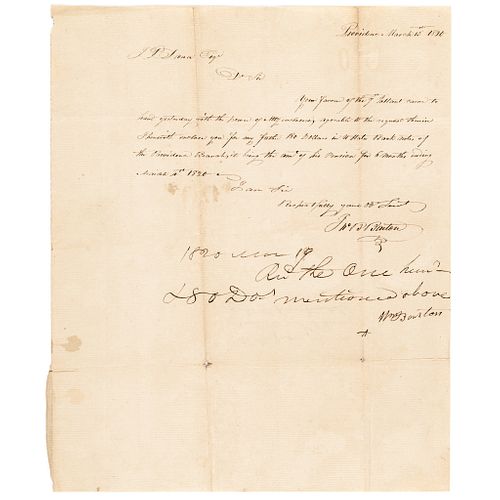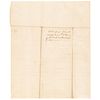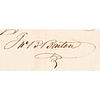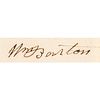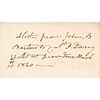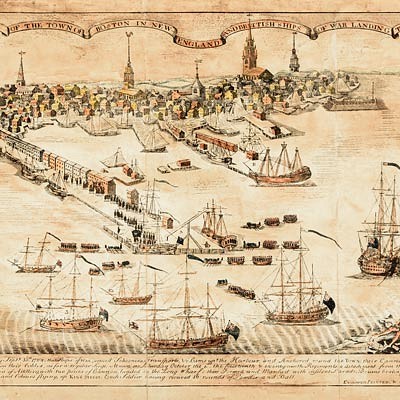Revolutionary War General WILLIAM BARTON + Son JOHN Autograph Letter Signed
Lot 5
Categories
Estimate:
$800 - $1,000
Absentee vs Live bid
Two ways to bid:
- Leave a max absentee bid and the platform will bid on your behalf up to your maximum bid during the live auction.
- Bid live during the auction and your bids will be submitted real-time to the auctioneer.
Bid Increments
| Price | Bid Increment |
|---|---|
| $0 | $10 |
| $200 | $20 |
| $300 | $25 |
| $500 | $50 |
| $1,000 | $100 |
| $2,000 | $200 |
| $3,000 | $250 |
| $5,000 | $500 |
| $10,000 | $1,000 |
| $20,000 | $2,000 |
| $30,000 | $2,500 |
| $50,000 | $5,000 |
| $100,000 | $10,000 |
| $200,000 | $20,000 |
| $300,000 | $25,000 |
| $500,000 | $50,000 |
About Auction
By Early American History Auctions
Mar 20, 2021
Set Reminder
2021-03-20 12:00:00
2021-03-20 12:00:00
America/New_York
Bidsquare
Bidsquare : Autographs-Colonial-Political-Americana
https://www.bidsquare.com/auctions/early-american-history-auctions/autographs-colonial-political-americana-6509
330 Lots of Rare, Historic Autographs, Americana, Civil War Era, George Washington, Abraham Lincoln, Slavery & Black History, Revolutionary War Era, Colonial America, Federal Period, War of 1812, Colonial Currency, Indian Peace Medals & more... Early American History Auctions auctions@earlyamerican.com
330 Lots of Rare, Historic Autographs, Americana, Civil War Era, George Washington, Abraham Lincoln, Slavery & Black History, Revolutionary War Era, Colonial America, Federal Period, War of 1812, Colonial Currency, Indian Peace Medals & more... Early American History Auctions auctions@earlyamerican.com
- Lot Description
Autographs
Continental Army General William Barton Autograph Letter Signed
General WILLIAM BARTON, (1748-1831). 1775 enlisted in the Continental Army, fought in the Battle of Bunker Hill. In 1777, Captured British Major General Richard Prescott for which was Continental Congress Presentation Sword honored, Member of Society of the Cincinnati. JOHN B. BARTON (1785-1869), son of General William Barton.
March 15, 1820-Dated, Autograph Letter Signed, "Jno B Barton" and endorsed below in rich brown ink with his statement "Wm Barton", measuring 8" x 9.75", 1 page, sent from Providence (RI), Very Fine. Written on quality laid watrermarked "R PARK & CO - TAUTON" (MA.) period paper, two pinholes at fold intersections. Original Letter written and signed in Providence, Rhode Island by John Barton and later signed by General William Barton while a prisoner at Danville,Vermont. Letter reads:
"Your favor of the 7th Instant came to hand yesterday with the power of atty enclosed, agreeable to the request therein I herewith enclose you for my father 180 Dollars in U State Bank notes of the Providence Branch, it being the amt of his Pension for 6 months ending March 4th 1820." William Barton writes below at the lower portion: "1820 Mar 19 -- Recd the one hundred & 80 Dos mentioned above... (Signed) Wm Barton".
General Barton is relieved to finally receive desperately needed funds due to him from Congress for his Revolutionary War military pension. Barton was placed in Danville Prison for debt. Barton was successfully sued in court for selling the same land to two different parties, which was a false claim. He refused to pay this debt. For this he was ultimately confined to the debtors' prison in Danville for 14 years, starting at the age of sixty-four. At the age of seventy-seven, he was released at the initiative of the visiting Marquis de Lafayette, who agreed to pay the balance of his debt. Subsequently, he helped to found the town of Barton, Vermont.
John B. Barton born in Providence, Rhode Island, USA on 1785 to William Barton and Rhoda Carver. John B married Hannah West and had 2 children. He passed away on 1869 in Providence, Rhode Island, USA.
William Barton (1748-1831) was an officer in the Continental Army during the American Revolutionary War who retired with the rank of colonel. He later served as adjutant general of the Rhode Island militia.
On August 2, 1775 he was appointed the adjutant of Richmond's Rhode Island Regiment. He was promoted to captain on November 1, 1775.
In late June and early July 1777, as a major in the Rhode Island state troops, he planned and led a raid on British headquarters, capturing Major General Richard Prescott. On the night of July 10-11, with 38 men and six officers in five whaleboats, Barton crossed Narragansett Bay, passed unobserved by three British frigates, and, landing about halfway between Newport and Bristol Ferry, went to the farm house where Prescott had his headquarters. The guards were surprised, the door of Prescott's room was broken in, and the general was hurried away half dressed and taken to Warwick Point, and afterward to Providence. For this exploit, the Continental Congress gave Barton a sword and passed a resolution honoring his service.
Barton was promoted to lieutenant colonel on November 10, 1777 and was made colonel of Stanton's regiment of the Rhode Island State Troops on December 1 with "rank and pay of colonel in the Continental Army" upon the resignation of Colonel Joseph Stanton, Jr. On December 19, Barton was re-appointed as colonel of his regiment when the enlistments of its members expired. Soldiers were re-enlisted for a term expiring on March 16, 1779. The regiment was part of the Rhode Island State Troops which was a brigade, commanded by Brigadier General Ezekiel Cornell, which consisted of two regiments of infantry and one of artillery for the defense of Rhode Island. In addition to Barton the other regiment of infantry was commanded by Colonel Archibald Crary and the artillery regiment by Colonel Robert Eliot.[1] In February 1778, Barton was commissioned in the Continental Army and command of the regiment was given to Colonel John Topham.
Barton was gravely wounded in the thigh while trying to rally American militia to attack the rear guard of a British raiding party that burned parts of Bristol and Warren, Rhode Island, on May 25, 1778. He never fully recovered from this injury, but did return in June 1779 to lead a battalion of light infantry, called the "Corps of Light Infantry", which consisted of four companies of 54 men each and operated in boats patrolling Narragansett Bay. Barton served in this capacity until the end of the war.
In 1783 Barton became an original member of the Rhode Island Society of the Cincinnati. When Rhode Island ratified the United States Constitution in 1790, Barton was sent to New York to notify George Washington.
After the Revolution Barton was active in the state militia. He served as the brigadier general in command of the Providence County Brigade from May 1794 until he became major general in command of the Rhode Island Militia from May 1802 to May 1809.
He helped to found the town of Barton, Vermont. Subsequently, Barton was successfully sued in court for selling the same land to two different parties. He refused to pay this debt. For this he was ultimately confined to the debtors' prison in Danville for 14 years, starting at the age of sixty-four. At the age of seventy-seven, he was released at the initiative of the visiting Marquis de Lafayette, who agreed to pay the balance of his debt.
Our Auction Contents:
Black History & Slavery: (Lots 1 - 63)
Abraham Lincoln Related: (Lots 64 - 74)
Historic Autographs: (Lots 75 - 235)
Colonial America: (Lots 236 - 261)
Revolutionary War: (Lots 262 - 304)
George Washington Related: (Lots 305 - 306)
Early American Guns & Weapons: (Lots 307 - 318) - Shipping Info
-
Early American provides in-house worldwide shipping. Please contact us directly if you have questions about your specific shipping requirements.
-
- Buyer's Premium



 EUR
EUR CAD
CAD AUD
AUD GBP
GBP MXN
MXN HKD
HKD CNY
CNY MYR
MYR SEK
SEK SGD
SGD CHF
CHF THB
THB